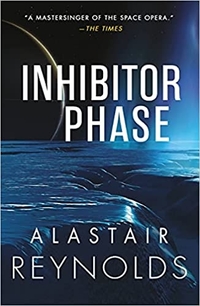Inhibitor Phase by Alastair Reynolds
 Friday, October 15, 2021 at 7:57AM
Friday, October 15, 2021 at 7:57AM 
First published in Great Britain in 2021; published by Orbit on October 12, 2021
Over the last 20-plus years, Alastair Reynolds has set several books and stories in the Revelation Space Universe, a troubled place where humanity is always at risk of extinction. Inhibitor Phase is the most recent of four novels, beginning with Revelation Space, that tell an ongoing story within that universe. Reynolds claims that Inhibitor Phase can be read as a standalone, but I think a reader who at least reads Revelation Space will find more meaning in Inhibitor Phase. For example, the significance of Conjoiners (humans with neural implants) and the role that Nevil Clavain played in a war between Conjoiners and non-enhanced humans might be puzzling to someone who isn’t familiar with at least some of the novels. For readers who want to begin at the end and don’t mind spoilers, Reynolds includes a chronology at the end of the book that will catch the reader up on Reynolds’ future history of humankind, including events that occur novels outside of this sequence.
Inhibitor Phase begins in the late 28th century with a fellow named Miguel who doesn’t realize he was once a different man, a man named Warren. Now he’s leading a community of humans living beneath the surface of a planet, trying to protect them from Inhibitors by keeping the humans hidden and quiet. Inhibitors, a/k/a Wolves, are machines that want to destroy and assimilate raw materials used by organic races, very much like the Borg of Star Trek fame. Miguel faces an early moral dilemma (is it acceptable to kill more than 5,000 people to keep 5,000 people hidden and safe?) before he’s taken against his will by a formidable woman named Glass. After Glass tweaks Miguel’s brain, he begins to recall that he was once a soldier (a Sky Marshal, actually) who took on the Conjoiners before he battled his brother. That part of the plot isn’t exactly Antigone, but if a writer is going to borrow ideas, borrowing from the classics is usually smart.
Glass has a plan to take the fight to the Wolves. The plan requires traveling to one planet to gather some stones, to another planet to acquire information, and to another planet in search of a ship that carries a secret weapon. Like much space opera, Inhibitor Phase is sort of a Homeric Odyssey (borrowing from the classics again) as each segment of the journey introduces new perils that the hero must overcome.
Some chapters flash back to Warren’s time as a soldier, when he participated in a clandestine invasion of Mars to free his brother, back when they seemed to be on the same side, before Warren became someone else. Later in the novel Warren becomes someone else still before making a final transformation. Identity is a fluid thing in the Revelation Space universe.
Reynolds gives space opera fans the kind of futuristic action they enjoy while adding enough science to make the action plausible. When a ship flies into the “molten shallows” of a star, Reynolds explains how manipulating “the basic informational granularity of local spacetime” to “swindle the incorruptible bookkeeping of classical and quantum thermodynamics” prevents the ship from melting. For all I know (and I don’t know much), this is gibberish, but gibberish is better than ignoring the unendurable heat of even a star’s photosphere. Other imaginative moments include a weapon concealed in blood that the heroes release by bleeding; a water planet inhabited by entities that function collectively as information storage devices; biologically engineered weapons called ninecats (just as fast and even more fierce than regular cats but a lot less cuddly); and a variety of alien races, the most interesting of which builds nests.
The universe is a big place and it’s been around a long time, even if humankind has not (relatively speaking). Inhibitor Phase is a long book, but a small part of a larger story. It doesn’t complete the story of humanity’s clash with the Wolves, or even advance it much. It does provide the surviving characters with an opportunity to take the fight to the Wolves, something that might happen in the next installment.
Still, Inhibitor Phase does the things that space opera should do. Reynolds offers the usual space opera menu of courage, sacrifice, perseverance, and fighting against long odds because that’s what it means to be human. Perhaps because the themes are so familiar in classic science fiction, the story does not seem particularly fresh. Yet Reynolds occasionally makes the story relevant to the reader’s life, as when he describes an alien race that justifies its atrocities by pretending they never happened (or, in the jargon of modern America, by dismissing their transgressions as “fake news”).
Characters are inclined to give inspirational speeches, as is the custom of space opera heroes. The speeches themselves are too predictable to be meaningful, but I did appreciate the development and evolution of Warren’s character. Before or soon after he became Miguel, he blocked his memories of the horrors of war that he endured and inflicted. When he returns to himself, he must confront moral judgments that he made and ask whether they were correct, whether he can find a path to redemption. That’s the kind of dilemma that science fiction, by stripping away the constraints of realism, can confront more directly than most literary fiction. The story works as an action novel, but it also builds depth from the arc of Warren’s life.
RECOMMENDED
Reader Comments